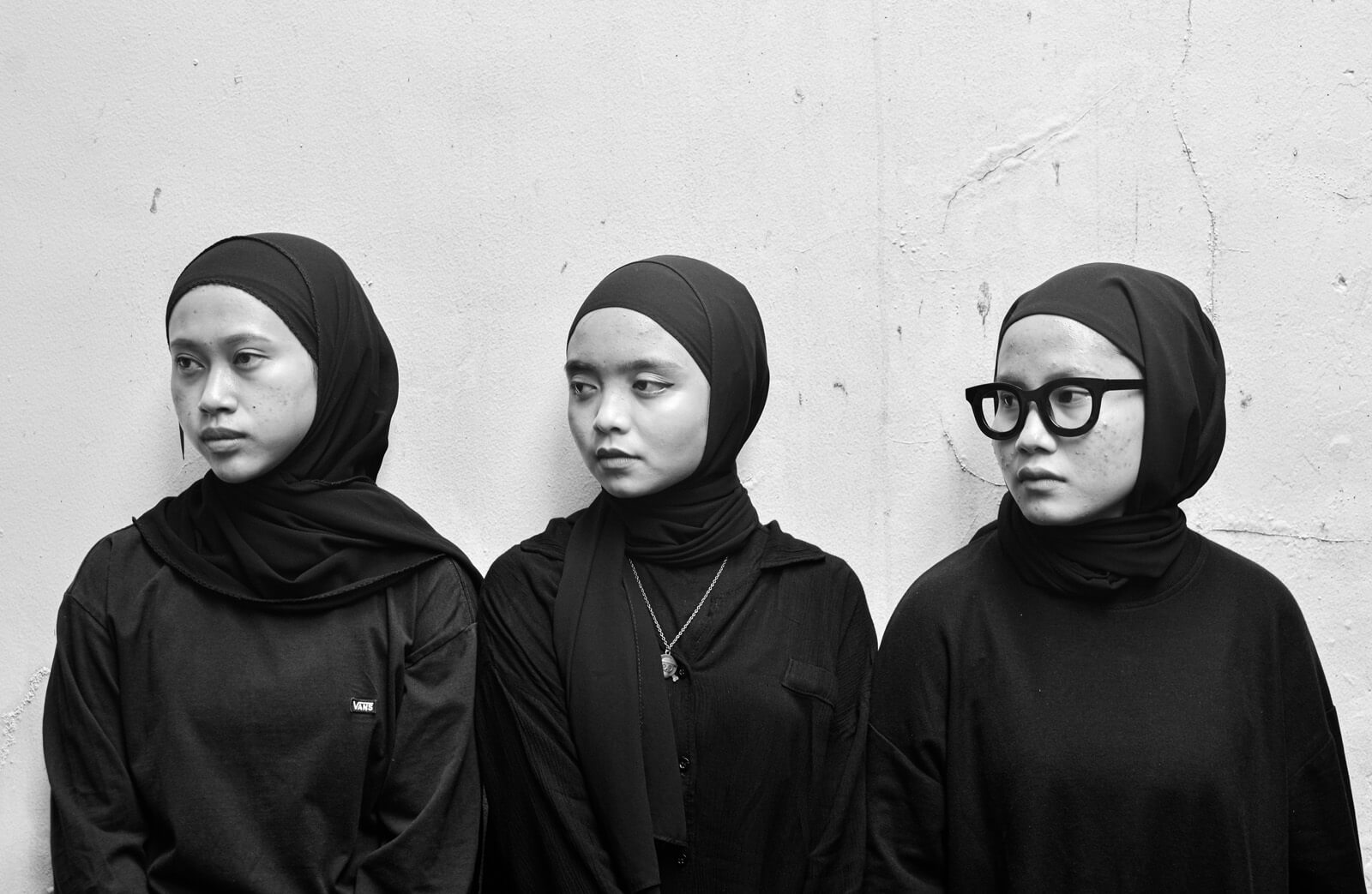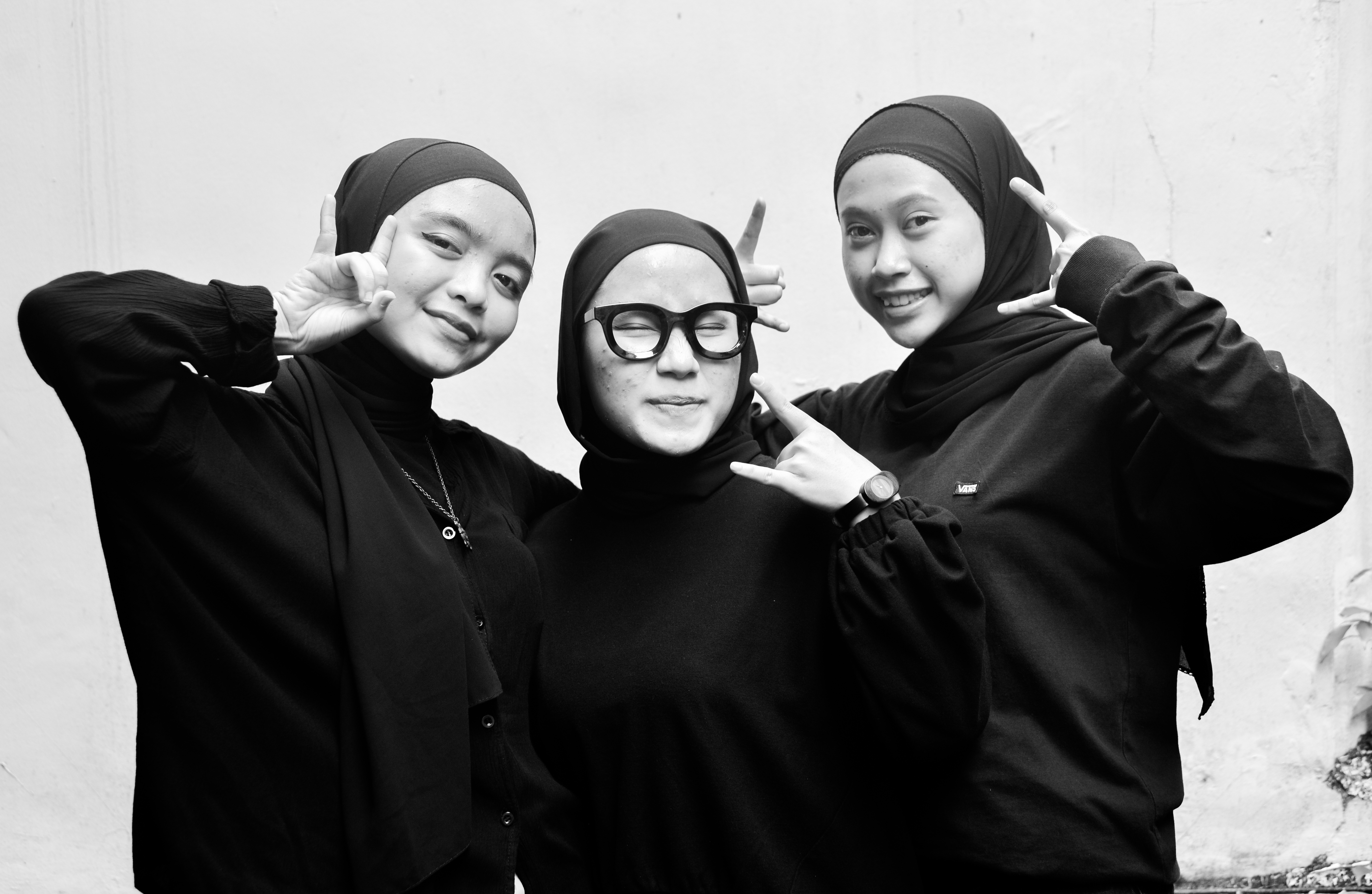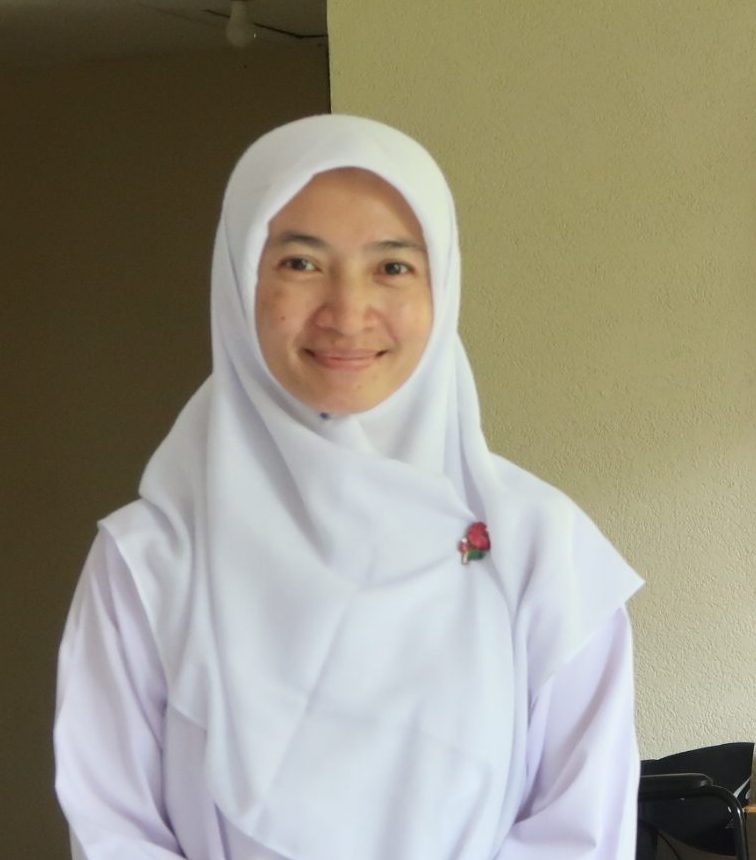




In 2014, three teenage girls rocked their way to fame from a small village in Garut, West Java, Indonesia. Firda ‘Marsya’ Kurnia (lead vocal, guitar), Euis Sitti Aisyah (drums), and Widi Rahmawati (bass) formed a band, Voice of Baceprot (pronounced ba-chey-PROT, means “noise” in a West Java dialect). Fans saw them as female artists who were challenging gender stereotypes and religious norms. The brave, talented teens, all wore the hijab or Islamic headscarves and played rock music. But the band’s performances and garb courted controversy and harsh criticisms too.
The girls say all they wanted was to play music and express themselves. Nine years after they burst into the music scene, Marsya, Sitti, and Widi reflect on how they have found meaning, and their voices in the noise around them.
It was 2014, and as a typical teenager living in Singajaya, Garut, West Java, Marsya started her day hours before sunrise. At 2:30 am, she would wake up and cite the holy Quran between her Tahajjud (night prayer) and Subuh (dawn prayer). Then, with her shoes secured inside her backpack, she would go on an hour-long walk, cutting through paddy fields to her school, Madrasah Tsanawiyah AlBaqiyatussholihat. “I didn’t want my shoes to get dirty,” she recalled.
In the afternoon, right after school, she and her schoolmates, including Sitti and Widi, would go straight to a madrasah, a Quran school. In the madrasah, they would teach younger kids to read Arabic before starting their sessions with a teacher, lasting until 9 pm.
After years of doing the same routine, the then-14-year-olds started to get listless. They began to rebel and became regulars at their school’s counsellor’s office. Their misdemeanour crime? Playing percussion on their desks, singing loudly, writing criticisms on the school’s bulletin board, and falling asleep during class.
In Indonesia, the counsellor’s office is seen as a place for correcting and punishing the “bad apples.” However, for the rebellious teens, it was where their unexpected journey began.
The counsellor, Cep Ersa Eka Susila Satia, whom they called Abah Erza, channelled the students’ rebellious energy into forming a drama club. But the three best friends did not fit in. So, Erza put the trio in a band to support the club.
Erza introduced Marsya to the guitar, Widi to the bass, and Sitti to a makeshift drum built from the school’s marching band’s instruments. Soon, Voice of Baceprot was born and started to cover top 40 hits for school events.
The trio explored music genres and listened to various rock bands. They fell in love with Rage Against the Machine, a Los Angeles band whose song ‘Take the Power Back’ resonated with how the girls felt about school. Under their counsellor’s guidance, they wrote their first hit, ‘School Revolution,’ which they released years later, in 2018.
The band found their voice and started singing their thoughts out loud. They have since composed and released songs about social inclusion, gender inequality, and climate crisis. Voice of Baceprot’s noise can now be heard beyond the mountains surrounding their hometown.

It’s all about the music
Nine years after their debut, Voice of Baceprot is busy touring many parts of the world. However, the trio still remember like yesterday the time they used to receive threats from the audience and had rocks thrown at them. They can now easily laugh it off, having gained more wisdom and maturity as adults.
“Who would not be shocked to see us?” said Marsya while Widi and Sitti nodded in agreement. “That rockthrowing was a sign that they cared,” said Widi, laughing.
The violence tapered off with time. However, they are no strangers to hateful and vulgar remarks on social media. Sitti recalled a commenter telling her to leave out her hijab since she wore a short-sleeved shirt once while playing the drums.
“They don’t know I had a bad experience hitting the drum with long loose sleeves. They got stuck! It can be dangerous for me. Those haters didn’t think about what was best for me; they just wanted to say what they like,” Sitti said.
The same happened to Widi. While playing the bass, critics would ask, “why was she putting her feet on the amplifier?” and “why were her hands showing?”
“People think that we are angels. They think we should never make mistakes and that we cannot slip,” Marsya argued.
The obsession with their clothes did not stop at home. During their European trip in 2021, most interviews would talk about their appearance. But for Marsya, Widi and Sitti, wearing a hijab is just as mundane as putting on deodorant in the morning or wearing pants before leaving home.
“If there is a list of things we want to be asked about, hijab will be the hundredth (item) on the list. We do not want people to focus on that. We want to talk about our crafts. We trained day and night to hone our skills and compose great songs. Let’s talk about that!” urged Marsya.
Heavy metal music magazine Metal Hammer called the trio “the metal band the world needs right now,” however, due to uninvited fascination with their look, some are doubtful of their skills. “There are people who believe that we are only famous because of what we wear,” Marysa revealed.
Getting tired of comments about their bodies and choice of clothes, the rockstar trio came up with a song, ‘Not Public Property.’
They also dedicated the song to help domestic and gender-based violence victims. Working with the Women of the World (WOW) foundation, they have been raising money to support these survivors.
“The song is our love letter to survivors of domestic violence. Most of them are children and women. Not only do they need to live with the trauma for the rest of their lives, but they also need to hear tone-deaf comments about their bodies. They are constantly being blamed. Then, people start to police how women should behave in public. It makes us feel like a woman’s body is public property. Nobody wants to be treated that way,” said the lead vocalist.
“We are aware that champions for this issue are multiplying. We are glad to live in an environment that is not homogenous. We need different perspectives. Women should always be involved,” Marsya added.

Breaking out into the world
From collaborating with the Indonesian legendary composer and orchestra Erwin Gutawa in 2017, having their own European tour in 2021, to rocking the stage of Wacken Open Air in 2022, the trio never failed to prove their force as charismatic performers.
“My favourite stage was in France. That was our first tour. The feedback was really satisfying, and I managed to give it all out,” said Marsya.
The metalhead trio admitted that despite rocking massive international stages, they still have stage fright, albeit never shows. They leave behind their nervousness by feeding the energy from the crowd.
In 2021, just before their European Tour, the trio had a chance to talk with one of their all-time heroes, Tom Morello. “I am a very big fan of your band. Your very existence as a band is very inspirational for people around the world,” said Morello to the trio.
There is no stopping the Voice of Baceprot now. Voice of Baceprot is not planning to stop any time soon.
“We are working on our album. We are finalising it right now,” said Marsya. “We are also looking forward to our Indonesian tour,” added Widi. “Yes, also an American tour!” Sitti concluded.
As the name of their village indicates, Singajaya or “Glorious Lion”, it seems these lionesses’ voices will not be muted any time soon.
The views and opinions expressed in the text belong solely to the interviewee and do not reflect the official policy or position of ASEAN.







